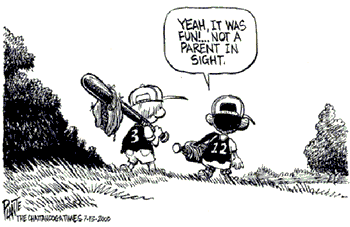Typically, named characters are more directly important than unnamed characters. This isn't to say that unnamed characters aren't important or necessary to the story, but they don't require the reader's immediate attention. Look at the Hunger Games series. Katniss is our heroic protagonist and catalyst for major changes in her society. Her parents are never referred to by name. However, they are extremely important to the story, because the choices they made shaped the person Katniss becomes (which, in turn, had enormous effect on the world in the form of all the events in the trilogy). In essence, unnamed characters who have any effect on the story tend to do so indirectly, and get none of the glory. If it makes it easier, think of Bambi's mom: nameless, but her role is vital to the story.
Unnamed parents are not uncommon in youth fiction. Having absent parents gives young protagonists more power (because they can do pretty much anything without adult interference). If a writer wants/needs to keep the parents present in the story, they can still get a lot of the effect of their absence by not naming them. But I'll talk about absent parents in YA fiction another time.
Unnamed parents are not uncommon in youth fiction. Having absent parents gives young protagonists more power (because they can do pretty much anything without adult interference). If a writer wants/needs to keep the parents present in the story, they can still get a lot of the effect of their absence by not naming them. But I'll talk about absent parents in YA fiction another time.
 |
| I got this from here |
If your unnamed character is the protagonist, forget everything I just said. When you find this, it usually means you're supposed to be able to drop yourself into their place. It helps you identify with the character better, because you aren't distracted by the fact that they have a name that isn't yours. Some great examples include The Yellow Wallpaper (wherein a woman is kept locked up in her room - which happens to have yellow wallpaper - as a 'cure' for her insanity, but ironically, it causes it), Fight Club (which I have neither read nor watched, but the first-person narrator - the guy played by Ed Norton in the movie - is nameless), and The Raven by Edgar Allan Poe (our narrator never gives us a name - or even a self-referring pronoun - which has spurred the theory that the narrator could very well be a woman).
 |
| Assume your literature conforms to societal norms? Nevermore! |
You'll notice that my examples of unnamed protagonists are all adult fiction. I have a theory about this: adolescents are egocentric. (I'm not trying to be rude; until the human brain has matured enough to build the right neural pathways, a person focuses better on their own body, thoughts, feelings, and actions than anyone else's.) This means teens are already putting themselves in the protagonist's shoes, because it's easier for them to think of events on the book as happening to them than to the actual protagonist, regardless of his/her name. That's why Bella Swan is a perfect everyman for female teens: she has few clearly defined characteristics, and any physical descriptions focus on the object of her affections instead of herself. Any reader can easily pretend to be Bella while reading Twilight.
Then you have the named characters. The names authors choose for their characters are very important. Let's give Hunger Games another look. Katniss is named after a tuber (you know, like a potato). That's food. Her role is to feed her family, so this is a fitting (but not overly obvious) name. Her little sister's name is Prim, short for Primrose. I had to look it up, but primrose (the Primula genus) is used medicinally to strengthen nerves (the thought of saving/helping Prim is a driving force behind Katniss's brave actions) and many other uses such as fighting bronchitis, pneumonia, flu, sleeplessness, headache, etc, which emphasizes that Prim is gifted in the art of healing (like their mother). I can't speak to how much of this was intentional (that's Suzanne Collins' bailiwick) but it does all fit quite nicely.
 |
| Tabula rasa. (Which just sounds like insulting Kristen Stewart's emotional range, but in Latin.) |
Then you have the named characters. The names authors choose for their characters are very important. Let's give Hunger Games another look. Katniss is named after a tuber (you know, like a potato). That's food. Her role is to feed her family, so this is a fitting (but not overly obvious) name. Her little sister's name is Prim, short for Primrose. I had to look it up, but primrose (the Primula genus) is used medicinally to strengthen nerves (the thought of saving/helping Prim is a driving force behind Katniss's brave actions) and many other uses such as fighting bronchitis, pneumonia, flu, sleeplessness, headache, etc, which emphasizes that Prim is gifted in the art of healing (like their mother). I can't speak to how much of this was intentional (that's Suzanne Collins' bailiwick) but it does all fit quite nicely.
 |
| Flower of a katniss plant |
Some characters have multiple names: they choose titles or alternate names for themselves. The first example that comes to mind is Voldemort from the Harry Potter series. For the majority of the series, everyone calls him "He Who Must Not Be Named" because they are afraid to even speak the name he gave himself, because it is associated with such evil and unspeakable acts. The phrase "I am Lord Voldemort" is an anagram for "Tom Marvolo Riddle" which is his given name. He hates his family and wants to distance himself from his given name, so he creates a new, more respectable - and fearable - one for himself. Near the end of the series, when Harry has to face Voldemort face-to-face, he calls him "Tom" to demean him, taking away the name Voldemort chose and forcing his unwanted name on him, implying that Voldemort is nothing more than the little boy who used to go by Tom.
 |
| What did you call me? |
Another great example is V (or Codename V) from V for Vendetta by Alan Moore. Instead of changing his name for prestige, like Voldemort, he changes it for anonymity. I suppose he also chooses "V" because it has ties to the camp that destroyed him, so it can be used to strike fear into his prey, if they pick up on who he is before he gets to them.
If you have other examples of anything discussed here (unnamed but important characters; unnamed protagonists serving as an everyman; particularly apt names for characters; or characters who change their names or assign alternate names to themselves) let us know about it in the comments!
If you'd like to read more about the topic of character names, check out some of these links:
This blog post from the Oxford University Press about names in literature (referring to the book Literary Names by Alastair Fowler, which is a pretty great name in itself)
This list from Mental Floss about 17 notable characters who were almost named something entirely different.
And for more fun, the real names that you may or may not know for the characters you definitely do!
I wanted to make a comment on an important distinction that I think you missed. When discussing Codename V you describe him as taking the name V for the sake of anonymity. While technically and in a literary sense this may be true. I think you missed the bigger picture. Which is of course, The Stolen Name.
ReplyDeleteV adopted his name after everything was stripped from him. All he knew was what the people at the camp had made him. He didn't make a conscious choice not to use his name, his name was taken, and he was labeled simply Patient 5 with a simple roman numeral placed on his door.
There are many stories out there where a protagonist/antagonist/incidental chooses not to use a name. But you missed making the point of characters who were stripped of their names, and the power that has in a literary sense to convey having our humanity taken.
My 2 cents.
(Disclaimer, I've only seen V for vendetta as a movie. I haven't read it [yet])
That's actually a really good catch. You're right; V didn't change his name in order to be anonymous. In fact, he didn't make a choice to change his name: he had to assign himself a name because he had none.
ReplyDelete(I'm in the middle of the book, and it seems like it may have been more of a choice there than in the movie, because the book lets you know that he has killed a LOT of people. As in, everyone who worked at the camp. Dozens and dozens of people. So it's sort of a toss up, as far as I can tell.)
I also entirely left out the mention that V needs a codename in order to present himself as a faceless everyman. Think of Evey's speech at the end of the movie, where she says something to the effect of: "He is my brother. He is my father. He is me." etc. With a codename, he could be anybody. (Like being nameless, but... with a name.)
You know, it's kind of like in The Princess Bride where Westley takes the name of "The Dread Pirate Roberts" not necessarily because he has to, but because it's that or be killed by the current Pirate Roberts, who isn't even the original.
DeleteAs pointed out there, it's all in the name. The original Dread Pirate Roberts had been retired for YEARS but no less than three people could still invoke fear due to the piracy of the first pirate.